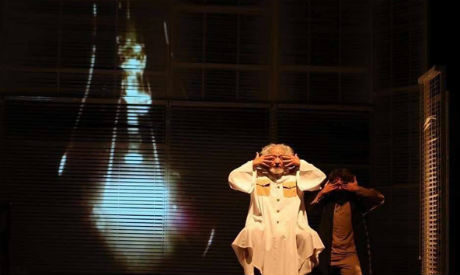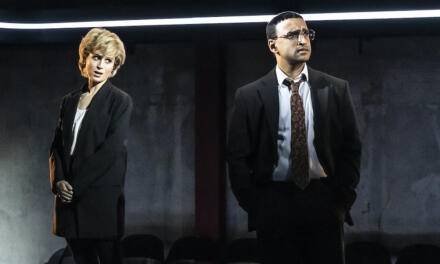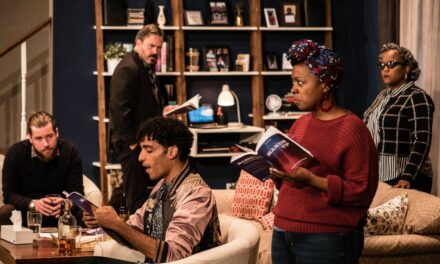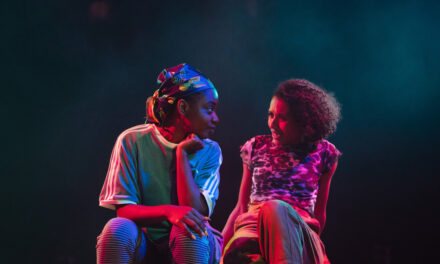In contrast to mainstream Arabic productions, the Iraqi play A Smell Of War did not solely rely on verbal language. The Iraqi National Troupe for Acting opted for the more difficult path: to create the atmosphere and environment of war, to render the spirit of conflict and of violence, and to visualize a human crisis.
Written by Methal Ghazy (Iraq) and Youssef Albahri (Tunisia), the fundamental story reveals a generational conflict in the context of war: the grandfather worships war, he adores violence and cherishes his old achievements as a war veteran, while his grandson refuses war and is almost afraid to step into an outdoor conflict zone.
The grandmother plays a vital role, as she is a strong supporter of life and of survival. She opposes her authoritarian husband and tries to protect the hope represented by her grandson.
The figure of the grandmother takes on a symbolic dimension, as she reminds us of femininity and motherhood as a connection to life and to the cycle of birth and fertility against death and destruction, yet this female figure has also lost her son to the war, and this is why she tries hard to resist the potential loss of his son.
Against the tradition of maternal figures celebrating the killing of their sons as martyrs, this Iraqi mother searches for life and dares to go against her husband’s military hallucinations. We witness a tour de force played out between husband and wife, where this elderly couple displays a history of pain and dehumanization before our eyes.
The two playwrights have done an amazing job delivering a dialogue that is multi-layered and rich in literal and metaphoric meanings, to the extent that it relates to all war situations around the world, and expands our understanding of war beyond the ordinary conflict of political powers to the extraordinary awakening of the human beast that fuels mass destruction.
The brilliant director Mohamed Emad avoids all the usual traps while delivering his message: he avoids the ancient Arabic rhetoric of war as well as the tragic portrayal of death and martyrdom, and he prevents us from falling into the general consumption of sympathy, guiding us to the big picture while analyzing its details and fragments.
We were confronted with the old war veteran’s character (played by Abdel-Sattar Al-Basri) who gradually seems like a dervish of war, one who has come to adopt war as his new religion, and who opens our eyes to the fact that war is not only created for political-religious benefits, it is an end in itself, and the human lives are turned into means to that end.
Al-Basri goes to the extreme presenting his character, he fills the stage of Al-Salam Theatre with his overwhelming performance, managing to bring madness into the space while fervently reciting his monologues as if they were war’s own bible. The artistic accomplishment—at the level of writing, directing, and acting—cannot be ignored, as it sets a new standard for the Arab region in the area of artistic reflection of the topics of war and violence.
In my opinion, A Smell Of War And Violence (by Jalilah Bakkar and Adel Al-Jaaibi, Tunisia) complement each other not just in terms of their meanings and philosophical approaches to the topic but also in terms of aesthetics and visual representation. A Smell Of War brought an exceptional visual concept to stage design, as it included a very well designed video projection that ranged from symbolic visualization to literal footage.
Whether it was symbolic or literal, the use of the projection was such an integral part of the scenography it defied the usual mode of video projection as an easy solution to fill space or to present what can otherwise not be seen. The video projections were carefully designed as part of the theatrical scene design, they completed the stage aesthetics by bringing a new digital depth that was organically part of the live performance and of the actors’ movement.
It is rare to see theatre productions that can handle video projections in this manner, and succeed in fusing the live performers with pre-recorded/designed visuals.
This is not merely a question of synchronizing the digital medium with the live, it is primarily about having the necessary imaginative craft to approach the theatrical space as a whole, designing and employing the digital medium as if it were live. It is vital to understand the digital medium as part of the momentary encounter with the spectators, and as a possibility to expand the aesthetic and imaginary horizons of the performances.
Artists who use video projections to fill in information gaps, or as a sort of parallel storytelling, actually fail to respect the live performance because they interrupt it with what looks like a sudden and intrusive film screening. The necessary challenge of live performance obliges every dedicated artist to integrate and “make live” the videos that are already recorded and edited with no possibility of change, it is the live performer’s interaction that can reincarnate those projections into immediate and live moments, via his/her performance and embodiment.
A Smell Of War is a signature piece by the director and scenographer Mohamed Emad who has brilliantly brought us the madness and the brutality behind the concept of war while opening up a new dimension on the Arab stages in relation to the aesthetics and visualization of aggression and de-humanization. It is such a pleasure to see Iraqi theatre taking those giant steps towards experimentation and the re-valorization of verbal language in relation to other languages of the performance, such as the visual, physical, and musical languages.
The ability to see the organic unity of all the performance’s languages, witnessing a unique artistic discourse connected to political topics, is a much-needed objective of the current Arab stage. Above all, A Smell Of War will always remind us of the possibility of offering a theatrical experience that analyses human behavior, criticizes and mirrors it back with such cruelty and aesthetic imagination that it actually manages to wake us from the numbness of the world’s historic violence into which we are born.
As spectators, we can watch such performances and re-appreciate theatre as a zone of war analysis, yet we can also forget our spectatorship vis-à-vis the performance and realize how much we are part of the global spectatorship watching wars on flat screens on a daily basis. We watch wars. Wars have become the new “theatre” and the new daily digital performance of digitalized death and graphic de-humanization. A Smell Of War recognizes that this is part of what we all breathe every day and that whatever we breathe becomes part of us.
* A version of this article appears in print in the October 18, 2018 edition of Al-Ahram Weekly under the headline: Battlefield generations
This article first appeared in English Ahram on October 22, 2018, and has been reposted with permission.
This post was written by the author in their personal capacity.The opinions expressed in this article are the author’s own and do not reflect the view of The Theatre Times, their staff or collaborators.
This post was written by Nora Amin.
The views expressed here belong to the author and do not necessarily reflect our views and opinions.


















